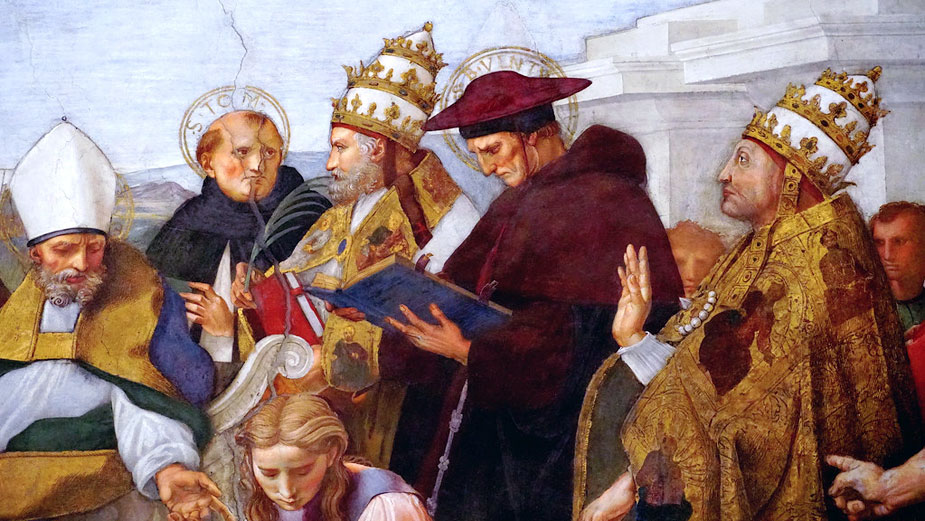Religion In The Darkest Age
 by James & Dr. Margaret Marshall
by James & Dr. Margaret Marshall
Harry now starts up another phase: “If I’m not presuming too much on your good nature, Mr. Brierly, what have you to say about Religion and its effect upon the wars in the Darkest Age?”
“You are not presuming at all, Harry, my lad, for really it affords me much pleasure to talk about those olden days. So come along with your questions.”
“Well then, first of all I have always understood that Christianity used to be a wonderful power, particularly in Europe, and had a vast number of adherents. If that were so why was it not powerful enough to stop the wars?”
The old man laughed a hollow laugh. “You have touched rather a sore point,” he replied. “In the first place, however, you must know it was not, properly speaking, Christianity at all that was practiced in those days, but Churchianity, which was a very different thing. Churchianity, as we knew it, was certainly not powerful enough to stop wars, because its spiritual strength had been undermined by spreading false teachings and by truckling to the world. Doubtless had priest and people adhered to the cardinal teachings of Christ, such as: Worship the Father in spirit and in truth; Do unto others as ye would they should do unto you, not to speak of the mighty ‘Love ye one another’–well it would have been impossible for such fearful wars to have taken place at all.”
“That may be so, though I suppose those teachings were really too high and pure for the people.”
“Well, of course, I don’t suppose they could have lived up to them in their entirety, but there is a mighty gulf between what they could have attained to, had they only set their minds to it, and what they did actually attain to. What I complain of is that the people did not make a sufficiently strong endeavor to live up to the teachings of the Nazarene. Where there’s a will there’s a way, you know; but alas! I’m afraid it was the will that was lacking in this case.”
“Could you go to the length of saying, then, that Churchianity was responsible for the chaotic condition of the world?”
“Yes, I do. Fundamentally and intrinsically the teachings of the so-called Christian churches were responsible for the centuries of wrongdoing which culminated in the Age of Horrors, as one might call it. But you have to go a very long way back to get to the origin and fountainhead of the trouble, or rather troubles, for they were many. You must get away back to the time of the Roman Empire, when Christianity had the misfortune to fall under its sway, and was then formed into a great state institution. Doubtless the teachings which Jesus Christ promulgated some two thousand years ago were Divine in their nature; and just as doubtlessly have they been altered and misrepresented through the process of translating from one language into another, and through so-called ‘revisions’ of the Scriptures from time to time down through the centuries.
“Mankind, however, is never satisfied with the bright pure gems of Truth which the great reformers and teachers bring down to Earth at stated periods, and he always considers it his duty to heap some of his own material rubbish on them, even sometimes to the extent of burying them altogether.
“The initial harm seems to lie at the door of the Emperor Constantine and his conclave of bishops and priests–Constantine I, who was known also as ‘the Great,’ though his ‘greatness’ lay in his military conquests and not in his spiritual attributes, in which he seems to have been deficient. Thus it was a powerful military commander who summoned the Christian Church dignitaries and presided over the Council that laid down the articles which were to guide the followers of ‘The Prince of Peace’ for many a long time.
“It happened in the year 325 A.D. when this Byzantine ruler assembled at Nicaea in Bithynia, a great ecumenical council of over 300 prelates, representing the different Christian churches throughout the Roman Empire and its satellites, at which they put into binding circulation certain dogmas, creeds and doctrines for the followers of the humble Nazarene. Thus did the military emperor Constantine put his imperial signature to the documents that were to affect most powerfully the destinies of the Christian nations.”
“But surely,” interjected Harry with astonishment and doubt in his blue eves, “you would not hold that these doctrines have been the root cause of these gigantic wars?”
“I appeal to a higher opinion than my own. It is the direct opinion of the Master Mind who showed us, in a very clear manner, how the teaching of these doctrines had led on from one thing to another and reached out tentacles in all directions, permeating the whole social fabric, and ultimately bringing about the late world catastrophes. But let me lead up to this point in my own way.
“And first of all I would say this, that the teaching that anyone can liberate another from his burden of sin and error, and take it upon himself, is false, and is quite contrary to all natural and spiritual laws known to man, and it at once falls to the ground when the light of our God-given reason is thrown upon it. Each individual is bound to reap what he has sown, neither more nor less; and to declare that, say a drunkard, who is practically a spiritual suicide, can slink into Heaven by a hack door through assuming a mere mental attitude of belief at the moment when he is passing out of his poisoned body, is simply a monstrous fallacy. And yet in my day it was quite accepted as an integral part of Christian teachings!
“Of course, such a pernicious and cowardly doctrine that a man dare lay the evil committed by him on another–that other, if you please, being one of the holiest and purest of the Reformers that ever lived on Earth–is quite obsolete in our day, except among a handful of cranks who are hopelessly out of tune with modern spiritual knowledge and enlightenment. We now fully understand that it is only by one’s own individual efforts, aided by the great God and Christ power, that righteousness and purity of life can be attained, this being the method of true Evolution, the true evolvement from lower to higher states. Certainly it is our duty always to help each other in the process whether in the physical, mental or spiritual field.”
“And yet when you come to think of it,” said Harry with a thoughtful air, “if a doctrine was false why didn’t God stop it?”
The old man smiled sweetly and passed his fingers through his silvery locks. “Yes, at the first glance it does seem strange, Harry, but not so strange when you come to consider the quality of human nature. Take this analogy: One person utters a slander against another; that slander is passed on from one person to another until the whole community knows about it. That slander may be a truth, or it may be a lie. That matters not–it goes forth all the same as a truth, and is believed as such until something comes along to prove it is a lie.
“Thus it is with a doctrine or creed; you have only to get your priest and people to keep on repeating it incessantly until in the long run it is accepted as God’s truth, divinely inspired. It matters very little whether it be a truth or an untruth, for the people will as readily believe the one as the other so long as you keep pressing it into their mentality. This truth forms a mighty example of that analogy I presented to you before of throwing a stone into a lake. It is but a local bubble at first but mark you how the agitation spreads until it reaches the most distant shores! The fact that quadrillions have believed in creed or doctrine proves nothing, except it be the people’s credulity. Bigger lies than that have had to be eradicated. Besides, the thinking done by mankind in the past has been in the collective form, with no real individualism in it at all. Hence, like sheep, they have been merely following their leaders, who have dictated to them what they are to think about and what they are to believe. Bear in mind, also, that what is the apparent truth of one age is the untruth of another age; and that what is considered a truth in Christendom was an untruth in, say, the home of the Buddha.
“Then you ask why God did not stop men from teaching this and other doctrines before they had done so much harm. God’s ways are not our ways. God is working in Eternity, we in finality–for the time being. Does God stop a man from robbing another, from murdering another? No. Man has been endowed with free will to a very large extent, and he has always the ‘God within’ to point out the right path. God doesn’t interfere with his evolution, and man must work out his own salvation, not in fear and trembling but by what are really experiments in life’s fields and then profiting by the resultant experiences. The same law that allows us to carry into effect the slightest evil or error is operative also in the case of the largest and most widespread evils or errors. And note this: the punishment is always inherent in the evil itself, and is not arbitrarily imposed by an external God. We must never blame the God without, but ask ourselves what we are doing to stop the evils and errors in our world. It is absurd and irrational to ask God to stop wars seeing that it is not He who makes them. It is man who makes wars, and if at any time he wants to stop then let him go and arrange for an arbitration with his adversary.”
“Good sound advice, I should say. And by the way, Mr. Brierly, a thought struck me while you were speaking. It is this: if the doctrine of the Atonement was a truth, and therefore Divinely inspired, should the teaching of it not have produced much better results?”
“A very good point indeed, for certainly the quality of a tree is known by the fruit it produces. If the doctrine was true, as Ecclesiasticism used to state, that Christ offered up Himself a willing sacrifice on the cross as a propitiation for the sins of the whole world, then it is only natural that one should look for a diminution in evil after thumping away at it for two thousand years. But instead of that we found that evil had increased to prodigious dimensions, being in fact the accumulation throughout many centuries of bloody wars and evil-doings of all descriptions, until ultimately it culminated in a veritable avalanche of catastrophes.
“And now let me deal with a point I briefly alluded to before. I said that the doctrine of Vicarious Atonement was fundamentally responsible for bringing down the whole of Christendom with a mighty crash. Quite so, but it was more on account of what it led to in other directions. Had it been possible to confine its teachings in the narrow path of ecclesiastical jurisdiction, its influence would have been reduced to a minimum. But most unfortunately it could not be so confined, and it ultimately formed the basis of other and far more serious blunders, for the same idea of leaning upon a savior gradually percolated into all sections of the people and into all their pursuits, causing them ever to look about for others, for anyone but themselves, upon whom to, lean, and upon whom they could place the full responsibility.
“Thus, from this grand cardinal mistake has sprung the idea that man must have leaders to lean upon in the religious world (popes, priests and ministers of all sorts and denominations); leaders in the political world, and in municipal work; leaders in the medical world, the legal world, the commercial world and the social world; also–the greatest tyranny of them all–leaders in the military world. And so on through all the numerous strata of our then highly complex system.”
“But surely,” said Harry, “there must always be leaders and followers?”
“To a certain extent yes, though we see very little of it nowadays beyond the teachers and the taught, as man is beginning to grasp the rudiments of the idea of man being a law unto himself. But in the Darkest Age the system was grossly misused and carried to excess altogether. The people gave practically plenipotentiary powers to their leaders to act on their behalf, and always on the distinct understanding: ‘Take these powers and do what you like with them, but whatever you do don’t worry me, or expect me to take any interest in your doings or misdoings.'”
“It looks to me as if it were the people’s own fault.”
“Well yes, to a large extent, for without the people’s acquiescence the leaders could not act; so that if the leaders failed the people, the people also were lacking in initiative; and after all, the leaders are chosen from among the people, so all are really responsible. But you see, Harry, there is another point wrapped up in this Atonement affair, and it is this: that in order to make the people feel that they stood in need of salvation for their sins, and in order to consolidate the ecclesiastical power, it was necessary always to keep them ignorant, humble and meek, and therefore the priest and the parson drummed into our ears for centuries that we were but weaklings and ought to give humble and hearty thanks to them, our leaders and representatives before the Most High, for permitting us to bite the dust at their august feet when coming to render our homage to God the Creator of all. Our God-given reason we had, of course, to leave on the threshold of the church when we entered to hear the arrogant shepherds expounding their false teachings to their famished sheep. ‘Twas not for the sheep to reason why; ’twas theirs but to believe and die!
“Ah, how stifling was the whole atmosphere for a man of free and open mind, to the plain man who glorifies God in his inner consciousness and finds ‘Tongues in trees, books in the running brooks, sermons in stones, and good in everything!’
“How can one wonder that the results of such teaching, persistently dinned into the ears of Christian humanity, had brought him to actually regard himself as a blind weakling? So weak that he had always to look to the priest and the medical man to heal his disease of mind and body respectively, looking ever to external sources for salvation and assistance, instead of developing the God-endowed resources within himself. The Church and teachers in general have dwelt far too much on the weaknesses, follies, and failures of humanity instead of the bright side of his nature, on his innate goodness and kindness. The result of such wrong methods, persisted in down through the centuries, has been that Evil gradually became the dominant and positive force and Good the negative. What a different world it would have been had Good been the strong dominant power, and Evil but as a weak, negative force, as indeed it is in the reality of things!”
Excerpt from World Of Tomorrow
Posted in Other Topics, True History of Manwith comments disabled.





